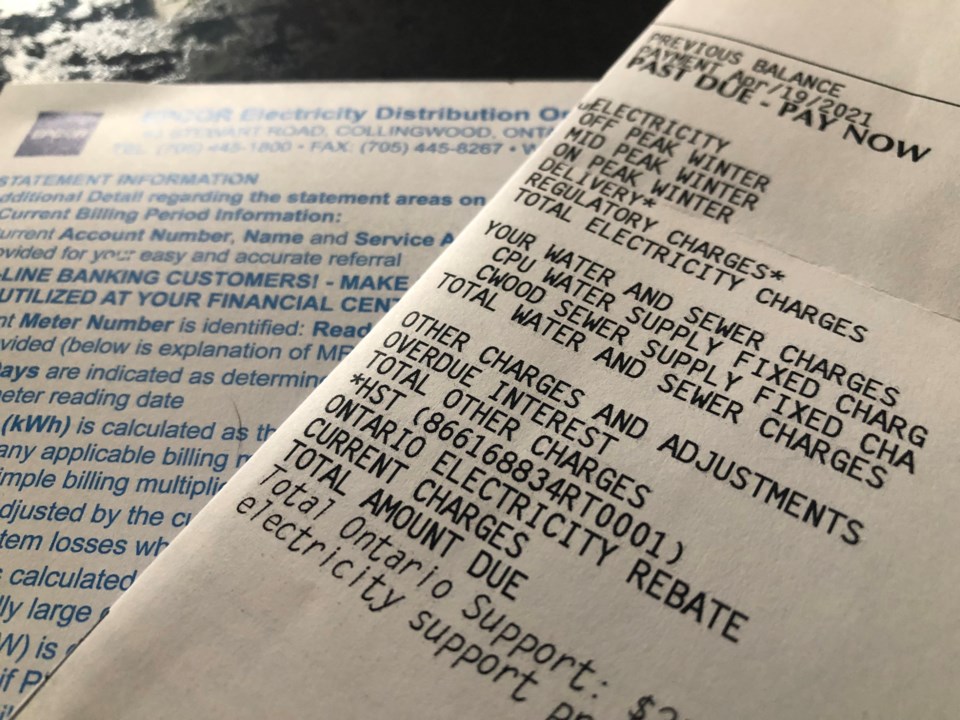Council has drowned a staff proposal for in-house water billing, following pleas from an EPCOR chief executive officer to stay the course and continue paying them to provide the billing service.
EPCOR chief executive officer Susannah Robinson spoke on Monday (March 21) to ask council to consider not making a town-staff-recommended move to switch water and wastewater billing in-house, following a split committee vote earlier this month.
“We think it’s in the best interest of the community. Ultimately, rendering two bills to the customer will result in increased costs when considered from a global perspective,” said Robinson.
As of now, ratepayers receive one bill from EPCOR for three services (water, wastewater and electricity), however, a recent town staff report explored whether it might make more sense to provide the taxpayer with two bills: one from EPCOR for electrical and another from the town for water and wastewater.
EPCOR provides the electric utility service to Collingwood customers, but water and wastewater is provided by the town. While EPCOR deals with the billing, the town still has the responsibility to follow up if an account goes into arrears or if there are billing errors.
For 2023, the current cost of service provided by EPCOR is $650,000. After speaking with EPCOR regarding the town exploring their own in-house options, EPCOR offered to reduce their rate to $520,000.
If the town had moved toward in-house water billing, staff estimated a 12-bill-a-year model would save about $426,888 over the first four years of a switch, while a six-bill-a-year model would save about $839,050 over four years.
However, during Monday’s meeting, Robinson noted that while the town as a corporation may save money through the switch, an increase in fees to provide the service of one bill on EPCOR’s side may mean an increase in fees charged by EPCOR to Collingwood residents.
During council questions, Mayor Yvonne Hamlin spoke about the history of the file.
She noted that Collus, a town-owned public utility, had provided water/wastewater and electricity billing previous to the sale of the utility to EPCOR. PowerStream (now Alectra Utility) bought 50 per cent of the utility from the town in 2012. EPCOR bought the entire utility in 2018. As a condition of the sale, EPCOR agreed to continue the billing arrangement as-is.
For a history of the sale of Collus to EPCOR, click here.
EPCOR Utilities Inc. started as Edmonton’s municipally-owned power and water utility 125 years ago and has grown to own and operate several electrical distribution networks and water and wastewater treatment facilities in Canada and the United States. The company has a sole shareholder – the City of Edmonton – and pays dividends to the city annually. According to EPCOR, they paid $177 million in dividends to the city in 2022.
“There isn’t this big pool of profit that we set out to (make),” said Robinson when questioned by Hamlin regarding the dividends.
“If it’s not a profit centre for you, why are you trying so hard to keep this business?” asked Hamlin.
“I think it’s the right thing for the residents,” Robinson responded. “We’re fighting to keep it because we have the investment in. Ultimately, we’ll have to go to the Ontario Energy Board and put that into rates, which I don’t want to do.”
“We don’t want to have to increase rates to cover the billing costs,” she said.
During council discussion, councillors raised concerns about moving billing in-house.
“I’ve been very conflicted by this,” said Coun. Christopher Baines. “I am not convinced this is the appropriate action at this time. I think we have so much on our plate over the next number of years that I fear there’s a risk for us to take on another project for staff.”
Coun. Kathy Jeffery agreed.
“I just don’t feel we should jump into this one right now,” she said.
The motion to terminate the billing agreement with EPCOR and move billing in-house was defeated by a vote of 7-2, with Hamlin and Coun. Brandon Houston still voting for an in-house billing model.
With files from Erika Engel.
